|
Brought to you by Dairy's Professional Development Organization®
|
|
Opportunities to learn...
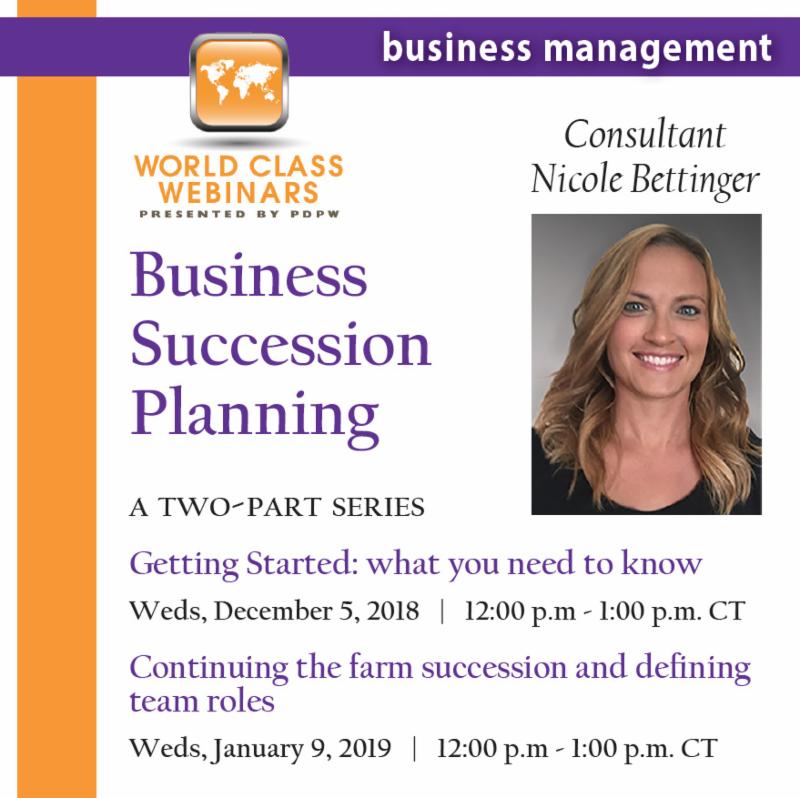 BUSINESS PLANNING WEBINAR SET FOR DEC. 5. A new PDPW World Class Webinar series will focus on one of the most intimidating obstacles that many farm families face: the transition of the business to the next generation. Nicole Bettinger, consultant with Family Business Consulting Group, will lead both sessions of this two-part webinar. The first session, "Getting Started: what you need to know," will be held from 12 pm to 1 pm central time on Wed., Dec. 5 and focus on the variety of ways that a successful transition can be accomplished. The second part of the series, "Continuing the farm succession and defining team roles," will be held on Jan. 9, 2019. After registration, you can listen to the webinar live or watch at your leisure via a link emailed after the webinar. Click here to learn more or register. BUSINESS PLANNING WEBINAR SET FOR DEC. 5. A new PDPW World Class Webinar series will focus on one of the most intimidating obstacles that many farm families face: the transition of the business to the next generation. Nicole Bettinger, consultant with Family Business Consulting Group, will lead both sessions of this two-part webinar. The first session, "Getting Started: what you need to know," will be held from 12 pm to 1 pm central time on Wed., Dec. 5 and focus on the variety of ways that a successful transition can be accomplished. The second part of the series, "Continuing the farm succession and defining team roles," will be held on Jan. 9, 2019. After registration, you can listen to the webinar live or watch at your leisure via a link emailed after the webinar. Click here to learn more or register.
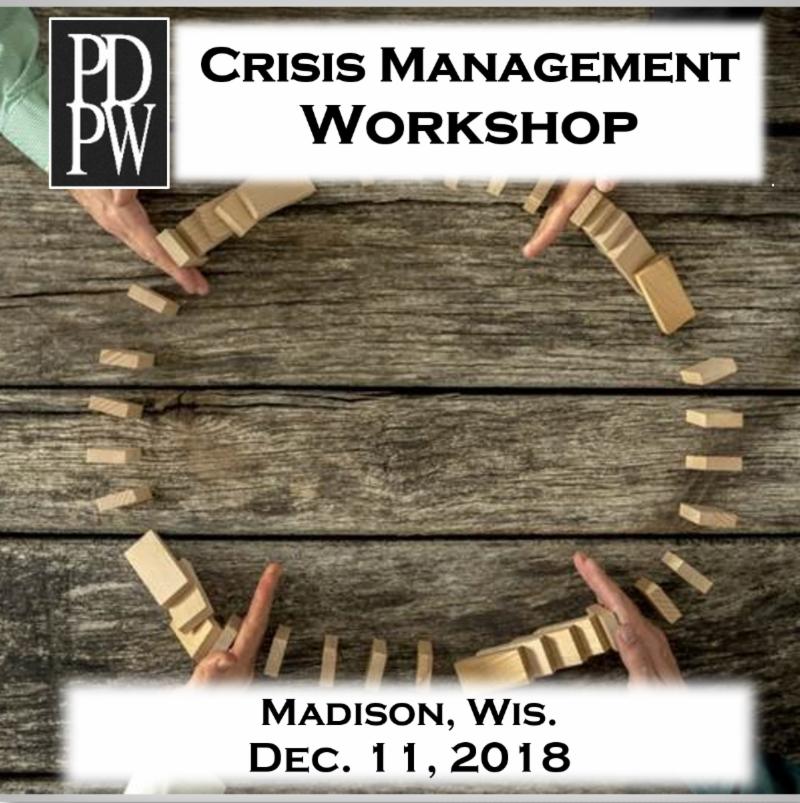
IS YOUR DAIRY'S PLAN READY? Preparing for a crisis with a comprehensive response and communications plan can position your dairy for success even in difficult situations. Make plans to attend the PDPW Crisis Management workshop on Tues., Dec. 11 from 9 am to 5 pm in Madison, Wis. This interactive workshop will provide you with the tools to respond during an emergency situation, including checklists, plans, response materials and fact sheets. The session will be facilitated by Judy Rupnow, senior counselor with MorganMyers. Learn more and register here.
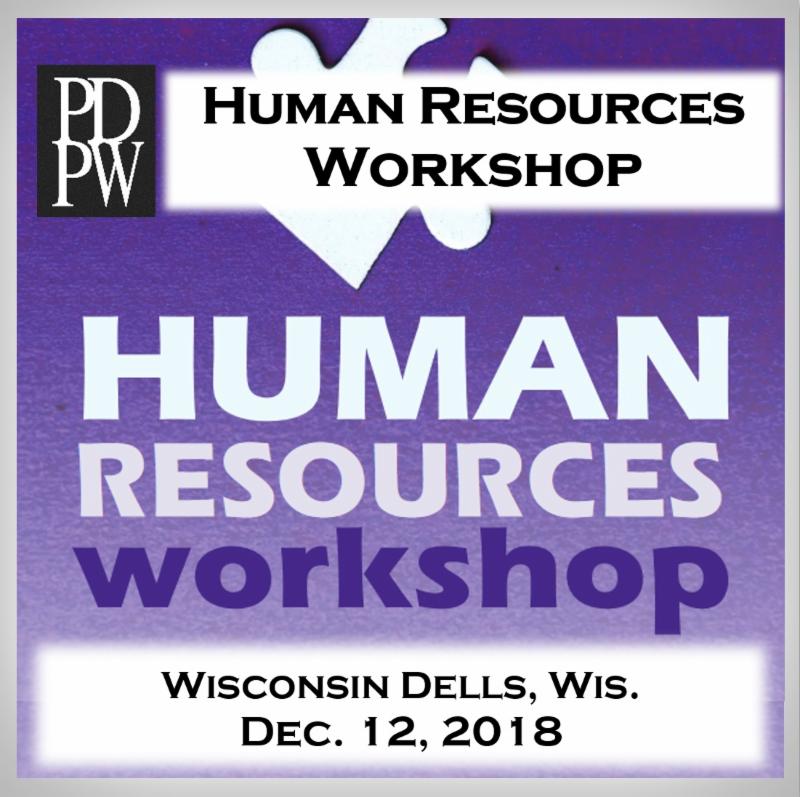
TAKE CARE OF YOURSELF AND YOUR TEAM with skills and practices from the PDPW Human Resources Workshop scheduled for Wed., Dec. 12, at Kalahari Resort in Wisconsin Dells, Wis. Presenters include Trevina Broussard, John Shutske and Rhonda Strebel; they'll focus on building strong teams, managing in a multi-generational workplace and taking care of the mental and physical wellbeing of yourself and employees.
Call 800-947-7379 to register or click here for more details.

DON'T MISS 2018 DAIRY FOOD & POLICY SUMMIT set for Dec. 19-20 in Madison, Wis. The summit is your opportunity to get new insights and join the conversations around some of the dairy industry's most pressing issues with industry CEOs, food system department executives and key decision makers and thought leaders from across the food value chain. Top-notch presenters will give updates on ag policy and exports, dairy trends, animal transportation, DNR regulations and more. Click here for the details and full list of presenters or call 800-947-7379 to register.

CREATE YOUR DAIRY ADVANCE ACCOUNT.
The education season is well underway - if you've invested time and money into your continuous education by attending an eligible program, you may as well take credit for it. Free for dairy producers, Dairy AdvanCE is a continuing-education tracker that enables you and your team members to track progress toward professional-development goals. This award-winning resource allows you to track and report your transcripts as an official record; employers and lenders are more likely to hire and lend to dairy producers who pursue continuing education. Sign up today to get started. Find more details at www.DairyAdvance.org.
|
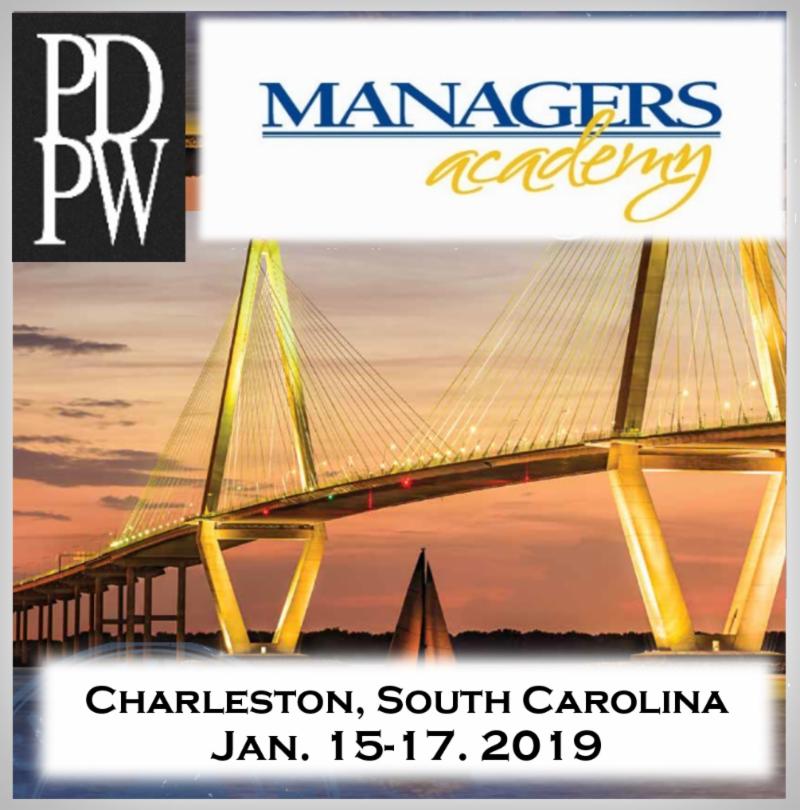
Managers Academy sneak peak...
MAKE PLANS TO ATTEND 2019 PDPW MANAGERS ACADEMY in Charleston, South Carolina, on Jan. 15-17, 2019. The theme for the three-day executive level training program is "Smooth Sailing" and will feature expert facilitators Ray Davis and Tom Thibodeau as well as behind-the-scenes tours and networking opportunities. Learn more
here
or call 800-947-7379 for details.
PUTTING LEAN AND SIX SIGMA PRINCIPLES TO WORK FOR YOUR OPERATION
will be the focus of an interactive workshop facilitated by Ray Davis at the 2019 PDPW Managers Academy.
Six Sigma
is a production philosophy that works to bring performance close to perfection using data, processes and tools. The name "Six Sigma" is the statistical measure that describes a defect rate of 3.4 defects per one million "opportunities" to create an acceptable output. Developed for manufacturing systems, the Six Sigma philosophy can be adapted to help nearly any type of organization reduce variability while increasing performance. Davis will steer workshop participants toward discovering the areas that need correction within their dairy businesses.
Davis will also share the principles of Lean enterprise, which focus on eliminating activities that do not create value for the organization's customers, and making sure activities that do create value are designed the most efficiently. He will focus on how to identify and reduce the seven "wastes," including extra motion, unnecessary work content, overproduction, waiting, inventory, rework and transport.
WHAT DO TEA, PEANUTS AND A SEAPORT HAVE IN COMMON WITH THE DAIRY INDUSTRY?
More than you might think!! Find out how these other industries handle the trade, environmental, regulatory and market-distribution challenges that are familiar to those of us in dairy.
- A tour of the only tea plantation in North America, will include a trolley tour through acres of tea bushes on the 10 mile by 6 mile Wadamalaw Island, and include a stop at the greenhouses. The visit to Charleston Tea Plantation includes a discussion with Bill Hall, founder and partner with the Bigelow Tea Company to learn how the company manages through labor shortages, regulatory nutrient management issues, climate variations and environmental difficulties.
- See firsthand one of the country's fastest growing refrigeration ports during a trip to the Port of Charleston. You'll hear how they manage expansion amid regulations, harbor dredging, employee recruitment and even hurricanes. With cargo worth $150 million sailing into the port each day and employing 1 in 11 of the state's residents, the Port of Charleston is a driving factor in South Carolina's economy.
- Learn from managers of a peanut-buying point about the challenges that South Carolina producers have in marketing their crops. While the state's sandy soil is perfect for raising peanuts, a shortage of processing mills means buying points are needed to work with out-of-state processors. Other obstacles faced by the industry include extreme weather, distribution, and - not surprisingly - food allergies.
IF YOU HAVE BEEN THINKING ABOUT ATTENDING and haven't yet, maybe this is your year! This program is packed with content that will help you be the best leader you can be. Airfare specials are going on this time of year..check it out.
|
For your dairy...
 IMPROVED COLOSTRUM MANAGEMENT CAN LEAD TO BETTER ANTIBIOTIC STEWARDSHIP
as well as improved calf health and profitability, according to an article and analysis from Penn State Extension. With more than 19% of heifer calves on U.S. dairies experiencing failure of passive transfer (FPT) due to poor colostrum quality and/or inadequate intake, the financial losses can add up quickly. Working with a veterinarian to develop clear protocols for feeding newborn calves, as well as managing calf diarrhea and other health issues will also ensure that antibiotics are used when appropriate and effective,
improving animal health and profitability. Read the full article here. IMPROVED COLOSTRUM MANAGEMENT CAN LEAD TO BETTER ANTIBIOTIC STEWARDSHIP
as well as improved calf health and profitability, according to an article and analysis from Penn State Extension. With more than 19% of heifer calves on U.S. dairies experiencing failure of passive transfer (FPT) due to poor colostrum quality and/or inadequate intake, the financial losses can add up quickly. Working with a veterinarian to develop clear protocols for feeding newborn calves, as well as managing calf diarrhea and other health issues will also ensure that antibiotics are used when appropriate and effective,
improving animal health and profitability. Read the full article here.

EFFECTIVE PEST CONTROL BENEFITS ANIMAL HEALTH AND BOTTOM LINE. Taking a proactive approach to controlling rodents during the winter months will help prevent structural damage to barns, damage to stored feed and limit risk of spreading disease to both animals and humans. Best practices for rodent control include clearing away debris, old equipment and trash as well as denying access to food and water sources. Removing and maintaining vegetation that enables natural predators to have better access to the rodents will also help. For more details on rodent-proofing your farm for winter and pest control methods, read this four-part series from Michigan State University.
|
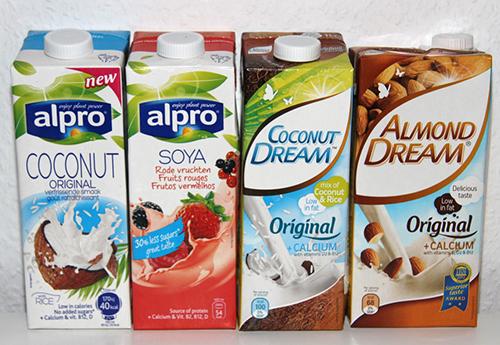 CONSUMERS HAVE MISCONCEPTIONS ABOUT NUTRITIONAL VALUE OF MILK ALTERNATIVES,
according to the results of a recent survey. The results showed that 77% of adults viewed almond milk as having the same or more proteins as dairy milk, and 73% viewed soy milk as having the same or more vitamins as dairy milk. It also noted that the top reason consumers believe plant-based milks are labeled as "milk" is because the products are comparable on a nutritional basis. The survey was conducted by Ipsos on behalf of Dairy Management Inc. Read an article about the results
here
and view a summary
here
. CONSUMERS HAVE MISCONCEPTIONS ABOUT NUTRITIONAL VALUE OF MILK ALTERNATIVES,
according to the results of a recent survey. The results showed that 77% of adults viewed almond milk as having the same or more proteins as dairy milk, and 73% viewed soy milk as having the same or more vitamins as dairy milk. It also noted that the top reason consumers believe plant-based milks are labeled as "milk" is because the products are comparable on a nutritional basis. The survey was conducted by Ipsos on behalf of Dairy Management Inc. Read an article about the results
here
and view a summary
here
.
 CHEESE CONSUMPTION OFFSETS FLUID MILK DECLINE
for U.S. consumers, according to a report from the Central Federal Order economists. Consumption of all dairy products on a milk equivalent basis grew by 104 pounds per person, from 539 pounds in 1975 to 643 pounds in 2017. This includes more than doubling annual cheese consumption since the 1970s, with mozzarella increasing from 2.1 pounds per person in 1975 to 11.6 pounds per person in 2017. Yogurt and butter have also seen significant increases. Read more in this article or the full report. CHEESE CONSUMPTION OFFSETS FLUID MILK DECLINE
for U.S. consumers, according to a report from the Central Federal Order economists. Consumption of all dairy products on a milk equivalent basis grew by 104 pounds per person, from 539 pounds in 1975 to 643 pounds in 2017. This includes more than doubling annual cheese consumption since the 1970s, with mozzarella increasing from 2.1 pounds per person in 1975 to 11.6 pounds per person in 2017. Yogurt and butter have also seen significant increases. Read more in this article or the full report.
|
For your business mind...
 SEEING THE BIG PICTURE IS AN IMPORTANT SKILL as you transition to management and leadership roles in your farm or industry role. Doing a good job at the day-to-day details is critical at every level of an organization, but effective leaders must also consider the larger impact and the operation's goals. This paradigm shift can be difficult because it requires letting go of some of the task management habits built over time, including overanalyzing, fixating on results, managing reactively, going solo, and overfilling the calendar. Read this article for strategies to overcome these habits and steer your organization to meet its goals. SEEING THE BIG PICTURE IS AN IMPORTANT SKILL as you transition to management and leadership roles in your farm or industry role. Doing a good job at the day-to-day details is critical at every level of an organization, but effective leaders must also consider the larger impact and the operation's goals. This paradigm shift can be difficult because it requires letting go of some of the task management habits built over time, including overanalyzing, fixating on results, managing reactively, going solo, and overfilling the calendar. Read this article for strategies to overcome these habits and steer your organization to meet its goals.

WHAT'S THE DIFFERENCE BETWEEN A MANAGER AND A LEADER?
While many assume the terms can be used interchangeably, a Fast Company article says that leaders attract a following who believe in their vision while managers have people who work for them without necessarily buying into the vision. In addition, leaders can influence and inspire people to action without having a formal title or management structure. The article outlines several skills to build leadership qualities, including:
- Practice the long-term view
- Develop your emotional intelligence
- Become a lifelong learner
- Ask for input
Learn more by reading the full article here.
|
The only way to change someone's mind is to connect with them from the heart.
--- Rasheed Ogunlaru
|
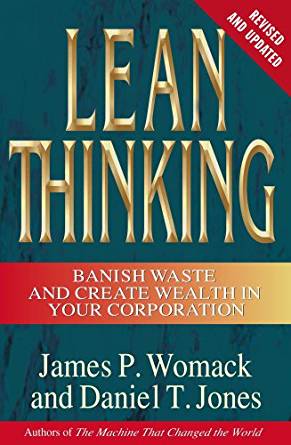 Book review... Book review...
LEAN THINKING: BANISH WASTE AND CREATE WEALTH IN YOUR CORPORATION.
Curious about how lean business principles were put to work by both multi-national corporations and small companies? Authors James Womack and Daniel Jones share how defining what the customer perceives as valuable, then focusing on the business activities that create those values, can deliver improvements in both productivity and efficiency. The book shares simple ideas that can breathe new life into an organization based on experiences of companies around the world. Learn more
here
.
|
|
A BIG Thank You...
TO THE PDPW SPONSORS who are supporting your professional development organization! As a producer-led group, we extend a heart-felt "Thank You!" to those that stand alongside our nation's dairy farmers.
Their support allows PDPW to execute best-in-class producer training and has enabled us to become the go-to resource for unified outreach initiatives. If you or a company you know is interested in participating as a sponsor, please contact us at abonomie@pdpw.org or call 800-947-7379.
See the full list of generous sponsors
here.
|
|
PDPW Education Calendar
| December 5 |
World Class Webinar -
Business Management & Succession Planning 1st in Series of 2: On Your Computer
|
| December 11 |
Crisis Management Workshop: Madison, Wis. |
| December 12 |
HR Workshop: Madison, Wis. |
| December 19-20 |
Food & Policy Summit: Madison, Wis. |
| January 9, 2019 |
World Class Webinar -
Business Management & Succession Planning 2nd in Series of 2: On Your Computer
|
| January 10, 2019 |
Effective Leadership Workshop: Madison, Wis. |
| January 15-17, 2019 |
Managers Academy for Dairy Professionals: Charleston, South Carolina
|
| January 29, 2019 |
Agricultural Community Engagement Meeting: Madison, Wis. |
| January 31, 2019 |
Cornerstone Dairy Academy Application Deadline |
| February 7, 2019 |
Social Media Strategy Workshop: Madison, Wis. |
| February 12, 13, 2019 |
Dairy Wellbeing Workshop: Green Bay, Wis. |
| March 12-13, 2019 |
Cornerstone Dairy Academy: Madison, Wis. |
| March 13-14, 2019 |
2019 PDPW Business Conference: Madison, Wis.
|
| April 6-7, 2019 |
Youth Leadership Derby: Kiel, Wis. |
STAY CONNECTED
800-947-7379
|
|
|
|
|